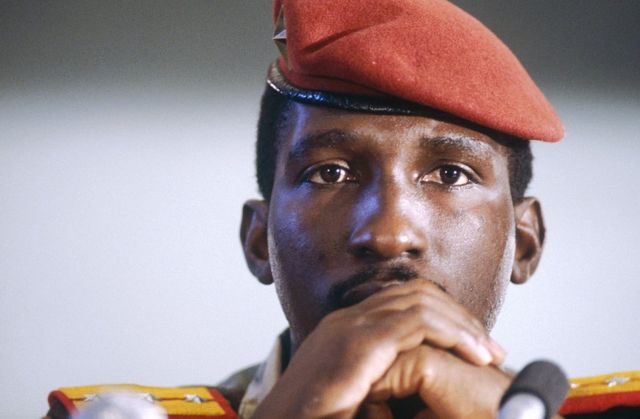Category: Article
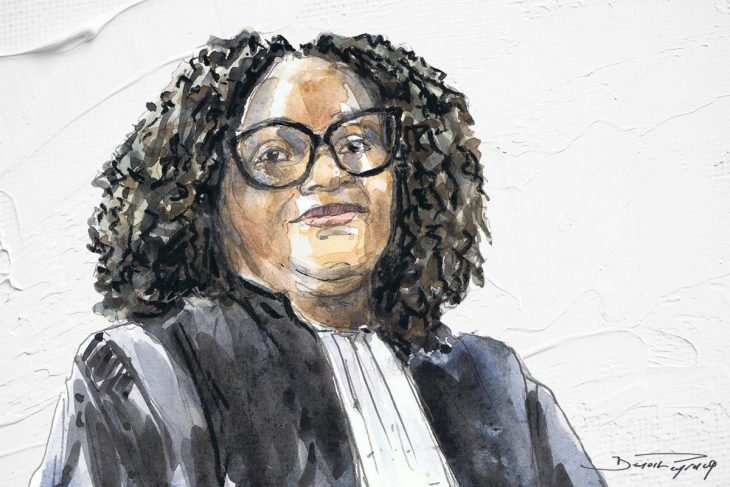
Anta Guissé: “The Sankara trial is a trial with history”
Anta Guissé: "The Sankara trial is a trial with history"
For more than twenty years, the French-Senegalese lawyer Anta Guissé has represented the defense before the international tribunals for Rwanda and Cambodia, as well as before the International Criminal Court. She has just pleaded for the families of the victims in the trial in Burkina Faso on the assassination of former president Thomas Sankara, whose verdict is expected on April 6. And shares her thoughts on the judgment of these extraordinary crimes.
JUSTICE INFO: On October 15, 1987, the president of Burkina Faso, Thomas Sankara, was assassinated along with twelve of his companions in a coup. Thirty-five years later, 14 people, two of whom are still at large, are being prosecuted for these murders and for “attacking state security and complicity in an attack”. That is to say, to quote your plea, for a crime “of exception in the midst of ordinary crimes”, a crime that “shakes the social order to its foundations”. In what way should this political assassination be considered a major crime, even if it is not an international crime?
ANTA GUISSÉ: The attack itself is a crime of exception, it is judged separately. Assassinations, on the other hand, remain crimes under common law. The particularity is that it affects a head of state. Burkina Faso has experienced many coups d’état, but this one is the bloodiest. It was a bloodbath in the form of a general execution. What is also particular is that it was premeditated and prepared, since at the same time as he was being killed at the Council of the Entente [the seat of executive power], they made sure to kill the people who were likely to be the closest to Sankara and could have intervened to thwart the coup.
It was a pivotal moment in African history, when we could have moved to a different way of approaching government on the continent, a different way of seeing the relationship between former colonizing countries and former colonized peoples. The fact that this was mowed down so violently and by his best friend [Blaise Compaoré, president of Burkina from 1987 to 2014] adds a somewhat Shakespearean dimension.
The personality of Sankara and this revolution in Burkina reminds me of the teenager I was at the time and what it meant to many people. I have leftist relatives and militant backgrounds; a Burkinabé friend often came to stay with us and died during those events. We always talk about the people killed at the Conseil de l’Entente, but unfortunately, other people died or disappeared in strange circumstances in the weeks and months that followed.
I remember an enormous sadness. I am in contact with Africans from all walks of life; when they learn that I intervened in this trial [as a lawyer for the civil parties], they all remember the day they learned of Thomas Sankara’s death – and they all wept. All of them, regardless of their nationality.
So it is the history of Burkina, but not only: because of Sankara’s extremely strong positions and speeches, it is the history of Africa. He was the king of the “punchline”! It was the time of the Houphouëts [Félix Houphouët-Boigny, president of the Ivory Coast from 1960 to 1993], of the Eyademas [Gnassingbé Eyadéma, president of Togo from 1967 to 2005], and Sankara was this young man who was leading a poor country but who suddenly found himself on the stage of the greats because he had this dignity, this willingness to work with what we have, to have another vision of development. There were certainly mistakes made during the revolution, but we cannot take away from Sankara that he was extremely honest and that made a big difference compared to the other leaders of the time and those who followed. It was a great hope that was totally destroyed.
Thirty-five years after the events, in judicial terms, the evidence may have disintegrated, but we also have the benefit of distance. We now see clearly who did what with this revolution.
We had a real trial, with ballistic experts and interventions on the facts: how people were killed, when, what happened in the months before October 15 and after.
JUSTICE INFO: Isn’t this what we call a trial for history?
Yes, but not only that. We had a real trial, with ballistic experts and interventions on the facts: how people were killed, when, what happened in the months before October 15 and after. I would rather say that it is a trial with history, in the sense that we have elements of understanding that we would not have had if we had judged the facts in the aftermath – for example, a certain number of French diplomatic cables that expose the various explanations given by the Compaoré clan, the tensions in “Françafrique” or in Côte d’Ivoire.
JUSTICE INFO: What do you remember about this trial? What did we learn?
That it was really premeditated, that it was many months old, even more. There had been several assassination attempts before. Thomas Sankara knew that his life was in danger and he voluntarily refused to enter into this spiral. We learned that Blaise Compaoré was a real traitor – we suspected it but it is now more apparent – and that he was a political animal. Both nationally and internationally, he had made sure that there would be no repercussions.
JUSTICE INFO: You have already acted as a defense lawyer before the Khmer Rouge Tribunal in Cambodia, where the facts were also being tried thirty-five years later. What is the function of a court in trials of this type?
I can’t see any parallel between the trial of Khieu Samphan [president of Pol Pot’s Democratic Kampuchea, between 1975 and 1979, sentenced to life imprisonment in 2014 and again in 2018 for war crimes, crimes against humanity and genocide] and the Sankara case. The Sankara trial is really that of an assize court; we are not only talking about political leaders, we are talking about the setting up of a commando. The facts are very different: we are not judging Compaoré on his management or his policies during his 27 years in power. It is really the attack that is being prosecuted. Of course, when we plead the case, we put the political dimension into it, but in the end, we are talking about the 13 assassinations that day. It is extremely precise, with people who held the weapons, who participated in the preparatory meeting, etc.
JUSTICE INFO: There are two major absentees in the trial: former president Blaise Compaoré, who has taken refuge in Côte d’Ivoire, and Hyacinthe Kafando, the leader of the commando group, who is on the run. To what extent has this diminished the value of the trial?
It did not diminish it. We could have had these defendants present but silent. Even if the Burkinabè would have liked to hear their voices.
JUSTICE INFO: The courts seized of these historical trials are often tempted to write history. How do you deal with the risk of jurists taking themselves for historians?
In the Sankara trial, the family did not want to rewrite history at all. For them, Sankara and his companions were assassinated by giving explanations that were false. And it was important to set the record straight. There was, of course, a historical context, but we were talking about very precise facts: that day, Thomas Sankara was killed as he was leaving the Council of the Entente and was not armed, he and his companions were executed. Period. This is a very factual development. It was a political assassination with the aim of taking power. We did not remake the history of the revolution. There were no experts on the historical context. We really talked to the actors and direct witnesses of the time.
Judges are not supposed to fight impunity; they are supposed to judge impartially.
JUSTICE INFO: And in the trial of the former Khmer Rouge leaders?
In this type of trial, the role of the defense is to remind people that we are before a criminal court. We are there to judge a man on acts that he is supposed to have committed. At the Khieu Samphan trial, we were told about the Khmer Rouge, the regime, etc. The relationship between the man and the facts is diluted. The fight against impunity is presented as the flagship of these courts, whereas the fight against impunity is the sole responsibility of the prosecutor. Judges are not supposed to fight impunity; they are supposed to judge impartially. This is where the problem often lies. We are dealing with extremely complex facts, with modes of responsibility, notably the “joint criminal enterprise”, where it is said that the accused did not need to have the desire to commit a crime to have committed it, and that it was sufficient that it was a foreseeable consequence. How can one be responsible for a crime that one did not want to commit? These are intellectual constructs to ensure that people, who were political leaders at a given time, can also be criminally responsible for facts that are far removed from their person. One understands the moral will [that underlies this objective] but one can arrive at totally schizophrenic positions on what it is to commit a crime and what criminal responsibility is. These are trials where there is a presumption of guilt. We remind, in defense, that in criminal cases, there is a presumption of innocence.
We put a lot of expectations in these trials, omitting to say that they will never offer everything we want. We hear great speeches about the fight against impunity, reconciliation, and truth, but on facts as complex and as extended in time as these, there is not only one truth – and this is specific to any trial.
Some jurisdictions are designed to clear the conscience of international opinion. I am not very sure that international jurisdictions really serve to avoid the repetition of facts.
JUSTICE INFO: But there is often a tension between the criminal and the historical. In Cambodia, before the opening of the first trial, the international prosecutor declared before an assembly of Cambodians that it was not a question of judging an ideology. A man from the countryside stood up in the room and told him that in this case he was only prosecuting “smoke”. In everyone’s mind, these trials were obviously judging an ideology. How do you understand this tension, when ideology is at the heart of the crime?
In the case of the Khmer Rouge, one of the major legal problems was that we were told that the political vision of the Khmer Rouge was not in itself criminal, but that the means used were necessarily criminal. We were in the middle of a big gap. The theory of a joint criminal enterprise, in which the crimes were foreseeable and the defendants were responsible, did not apply. And it was necessary to retain this mode of responsibility. We said that if one is transforming a mode of responsibility because one cannot make the link with the crimes otherwise, one is not making law. We never argued that there were no crimes at such and such a place; we simply said: his participation in such and such a meeting does not lead to the conclusion that he participated in the commission of these crimes.
There is a more philosophical question behind your question: is a criminal trial the right form for this type of case? This is a real question and it is all the more problematic in the case of particularly old events, where the most direct perpetrators are dead.
I think that if Khieu Samphan had not been the last of the Khmer Rouge leaders alive, we would not have reached the same result. At a certain point, one does with the means at hand and says that there is no other way than to condemn. After the first conviction of Nuon Chea [former number 2 of the Khmer Rouge regime, sentenced to life imprisonment in 2014 and again in 2018 for war crimes, crimes against humanity and genocide] and Khieu Samphan, a newspaper established the amount of money spent to reach this judgment and said that we finally had his justification. When it comes to individuals who are essentially politically responsible, far from the facts, one must read the justifications, but the judgments are 2600 pages long and no one reads them. If one does not try to understand but only to validate a starting postulate, what was the point of a trial?
I believe very much in the pedagogical value of a trial. Certain jurisdictions are designed to allow international opinion to wash its conscience a little on situations in which it did not intervene. I am not very sure that the jurisprudence of international courts really serves to avoid the repetition of facts. Those who are often missing from the dock are those who had the power to make decisions at the time of the crises. Whether in the Central African Republic or in Rwanda, it is frustrating to know that there were United Nations missions on the ground and that the crimes were not prevented. This should challenge us: what are we doing wrong to make this happen again?
JUSTICE INFO: You defended Khieu Samphan, a revolutionary who served a reviled ideology that destroyed millions of lives in the name of class struggle. Your Rwandan clients were accused of embracing a racist ideology that cost hundreds of thousands of lives. In the Sankara trial, you represented the families of the collaborators of a man revered for his anti-colonial, pan-African ideology and visionary ideas. Was it a breath of fresh air for you to be on the side of the victims and a positive icon?
I have always enjoyed being a defender because I like to take the time to try to understand and not have a Manichean view of things. In the Sankara case, there is a more personal dimension, assisting the family of a person I particularly admire and who played an important role in my personal development. It’s a breath of fresh air because it’s a different way of working, the pressure is different. In my other defense trials, there is a much more intellectualized aspect. In Sankara, the affect was clearly more important. In my plea, I was overwhelmed by emotion and I did not expect it. I have sometimes been very moved when listening to people testify in international tribunals, but when I was pleading, it was new. To “defend” an icon whom one has respected is a special professional experience, one of the most beautiful I have ever had.
JUSTICE INFO: Was it nicer to be loved by the public, instead of being the ugly duckling?
It’s a job where you learn to be loved one day, and not the next. I look at this with a little amused distance. Of course, it’s more pleasant, not to be loved – that’s a very furtive feeling – but to carry the word of a family and to represent a man who had a vision and who died of it.
JUSTICE INFO: Could you have been a defendant in the Sankara trial?
No, I couldn’t, I wouldn’t have accepted. Because of affect. The lawyer has to go where he knows he can do a good job.
JUSTICE INFO: How could the Cambodians understand this when you accepted to defend Khieu Samphan there?
Again because, for me, it was perhaps easier to put an intellectual distance with facts about which I had no personal history. You don’t necessarily do a good job if you’re too close.
JUSTICE INFO: Rwanda, Cambodia, Burkina Faso: in all these cases, the defense lawyers in particular point the finger at foreign responsibilities, which are never judged by these criminal courts. How do you feel about this hollow trial that never comes to fruition?
This is one of the freedoms that we have as lawyers, to put all this forward. There is the trial in the courtroom and what will come out of it to fuel a debate outside. What you put forward in a court of law can feed another discussion.
JUSTICE INFO: But is it a source of frustration or do you accept it that way?
It’s a question of power, of [power relations]. I don’t accept it, but we can denounce it. Bringing these flaws to court is a way of exposing them. I am well aware that states act according to their interests and that, as long as the balance of power is like that, it is difficult to change things. It is not a trial that changes the world. The fact that we are only dealing with individual responsibility implies that we are only interested in one part of the problem.
JUSTICE INFO: You often denounce international justice as being “out of touch” and here you are again as defense counsel in the trial of Central African Alfred Yekatom before the International Criminal Court. What justifies your continuing to do so?
There is a particular adrenaline in these trials. In defense, we have the means to explore things that we cannot necessarily do in a national practice. The real question is the way in which the debates are conducted at the hearing. It is true that after having tasted national justice in the Sankara trial – even if on different facts – knowing that the public can come, that it follows what is said in the press on a daily basis, that the actors speak openly, gives us a particular impact that we do not necessarily have in an international jurisdiction.
Like many Black men and women who achieve some professional visibility, we know that we want to do well since, given the prejudices, that would risk closing the door on ten others who are behind us.
JUSTICE INFO: Being a woman and being a black woman in these international courts, what does it matter?
It’s more a matter of perception among people. Like a lot of Black men and women who manage to get some professional visibility, we know we want to do well since, given the prejudice, that would risk closing the door on ten others who are behind us. It’s a responsibility. Even on the side of the accused, there is this notion that being defended by a white man is always better than by a black woman. It is a question of countering this before international jurisdictions that are often inaccessible to professionals who come from the South. Who can afford to do even an internship there? For a young lawyer from Latin America, Africa or Asia, you have to hang on to get a Schengen visa. It is still a system for the rich, despite the efforts made. We know that it gives us a little hope to know that there are also people who look a little like us and who can be in the courtroom.
If it is a question of international justice and confronting the universal, then I am the symbol of universality. I am at the crossroads of many stories.
JUSTICE INFO: In Cambodia, for example, was there a moment when you felt, well beyond the trial, that you were succeeding in eroding stereotypes?
I can’t say that I think about this every morning when I wake up. I’ve seen on the streets of Phnom Penh that you don’t necessarily see black women like me – let alone in a lawyer’s office. So yes, we break the stereotypes. I am not a sportswoman, I am not a dancer, I am not a singer. I’m a lawyer in a black dress [laughs]. I was ‘mè thirvi khmao’, the black lawyer. Even the client might have wondered if he was taking the risk. Someone on the [defense] team told me that when it came to choosing, my client said, “Oh yeah, that would be modern.”
And then, if it’s about international justice and confronting the universal, well, I’m the symbol of universality. I am at the crossroads of many stories. But in the end, it has to be anecdotal: it’s what is said that is important. To finally see heroes who look like us on TV, to be able to project ourselves, it’s important when you’re black and you’re a woman. It should stop feeling good and just be normal but it’s not yet.
How to talk about immigration, raw materials, development problems, without talking about that, about the traces of the colonial past?
JUSTICE INFO: The colonial past is back on the table of justice and reparations. You are a woman of law, of Senegalese descent – the country of Léopold Sédar Senghor – and Martinique – the country of Aimé Césaire. What does this return of the colonial era and this demand for justice inspire in you?
What I see in France is a real regression. We are coming to a time when we can begin to see history in the face, but as much as the discussion is taking place, on the political level I hear the backward-looking and retrograde speeches of Zemmour, Le Pen and consorts [Éric Zemmour and Marine Le Pen, two far-right candidates in the presidential election in France]. Even among people on the left, there was this idea of what the colonies, education, etc. brought, and of denying things. How can we talk about immigration, raw materials, development problems, without talking about that, about the traces of the colonial past? It would be a real catastrophe if we could not have this discussion. It would be nice to have people who are a bit uncomplicated to talk about it, without having speeches like “France, you either love it or you leave it”, to be more subtle than that. The discussion could be healthier, it is not yet but it is on the table.
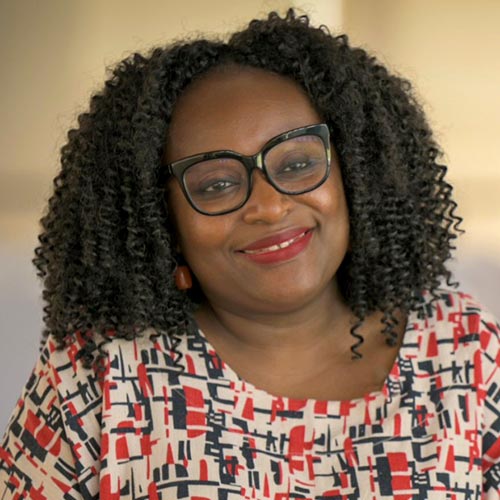
ANTA GUISSÉ
Anta Guissé has been a member of the Paris Bar (France) since 1999. She regularly pleads before national criminal courts. Between 2002 and 2010, she worked on several defense teams before the International Criminal Tribunal for Rwanda. In 2012, she became international counsel for former President Khieu Samphân before the Extraordinary Chambers in the Courts of Cambodia. Since 2021, she has represented Central African Alfred Yekatom before the International Criminal Court. In Burkina Faso, she defends the family of Thomas Sankara in the trial of his presumed assassins.
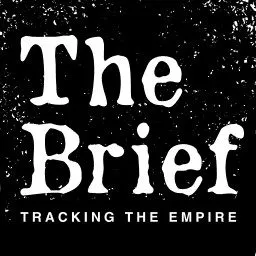
The Brief Podcast – Sankara’s revolution
Sankara’s revolution
Thomas Sankara’s assassination in October 1987 abruptly ended the life of a revolutionary Pan-Africanist who transformed Burkina Faso in four years of remarkable revolution. We are joined by AMBER MURREY and AZIZ FALL to discuss Thomas Sankara, his political project in Burkina Faso, his anti-imperialism abroad and their book A Certain Amount of Madness: The Life, Politics and Legacies of Thomas Sankara.
Episode: 024 Sankara’s revolution
Date: 18 February 2022 | Length: 73:45
Bonus: Aziz Fall on the Sankara trial: 17:26
Support The Brief Podcast on Patreon
Briefing Notes
- Murrey with Aziz. A Certain Amount of Madness: The Life, Politics and Legacies of Thomas Sankara (Pluto 2018)
- Sankara. We are the heirs of the world’s revolutions (Pathfinder Books)
- Burkina Faso Military Coup Reflects Wave of Insecurity in West Africa (Black Agenda Report)
- Turse. “Another U.S.-Trained Soldier Stages a Coup in West Africa.” (Intercept 2022)
- GRILA: The Group for Research and Initiative for the Liberation of Africa
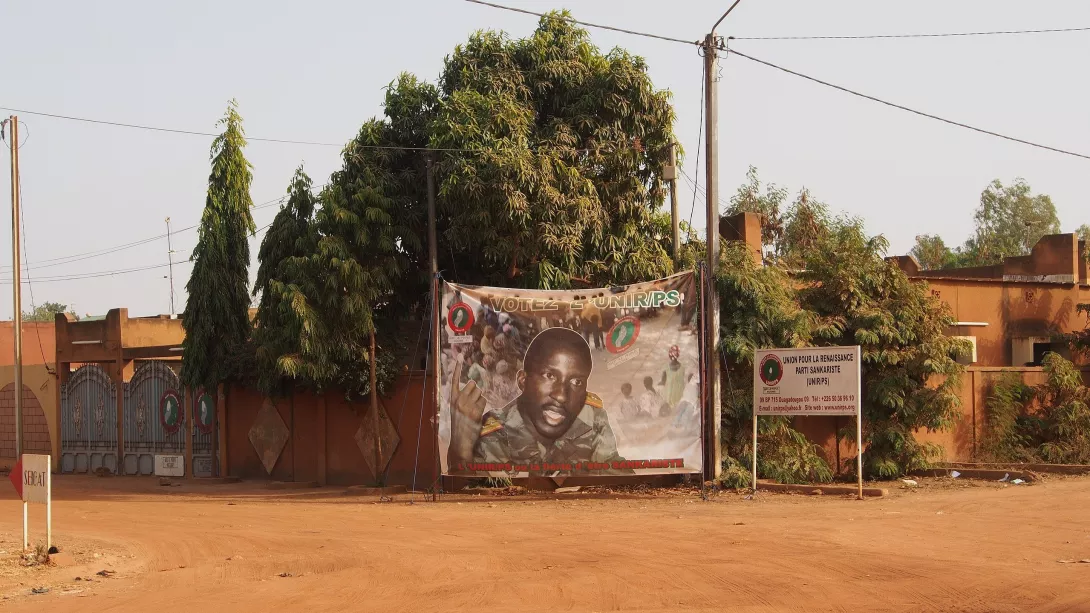
Afrique XXI – « Procès Sankara ». Le long combat des justiciers de l’ombre
« Procès Sankara ». Le long combat des justiciers de l’ombre
Document sonore · Pendant des années, une poignée d’activistes et d’avocats s’est battue pour que les assassins de Thomas Sankara et de ses douze camarades soient un jour jugés. Une lutte de longue haleine qui semblait perdue d’avance, mais qui a finalement abouti après la chute de Blaise Compaoré. Alors que le procès des responsables présumés du complot se poursuit, Aziz Salmone Fall revient sur les différentes étapes de ce combat.
L’histoire est peu connue, y compris des Burkinabé. Qui sait en effet que sans la ténacité d’une poignée d’activistes panafricains et d’avocats burkinabé qui, pendant plus de deux décennies, se sont battus dans l’ombre pour que justice soit rendue à Thomas Sankara et à ses douze camarades tués le 15 octobre 1987, jamais peut-être le procès de leurs assassins, qui a débuté le 11 octobre 2021 à Ouagadougou, n’aurait eu lieu ? Et que sans la volonté de ces quelques militants inconnus du grand public, jamais probablement leurs corps n’auraient été exhumés des fosses dans lesquelles ils avaient été jetés quelques heures après leur exécution, à la tombée de la nuit…
Parmi ces activistes, Aziz Salmone Fall a joué un rôle moteur. En 1984, ce fils d’un diplomate sénégalais et d’une universitaire égyptienne, aujourd’hui installé au Canada où il enseigne, a fondé avec d’autres militants le Groupe de recherche et d’initiative pour la libération de l’Afrique (Grila). Ce groupe s’est donné pour objectifs de « contribuer à l’émergence et à la consolidation du développement autocentré en Afrique et à la solidarité internationale qu’il requiert », et de soutenir « les forces démocratiques et progressistes » sur le continent.
C’est un hasard si le Grila a vu le jour à peu près au même moment que la révolution burkinabé. Certes, ce groupe se retrouvait pleinement dans les orientations politiques de Sankara et de ses camarades, et suivait « avec beaucoup d’intérêt ce processus de changement de rapport de production », selon les termes de Fall. Mais il avait des objectifs qui allaient bien au-delà du cas burkinabé. Après l’assassinat de Sankara et de ses camarades le 15 octobre 1987, le Grila va toutefois jeter toutes ses forces dans le combat pour que justice soit rendue dans cette affaire.
« LA RECTIFICATION A ÉTÉ UN LONG SIMULACRE »
Au début, cette bataille juridico-médiatique semblait perdue d’avance. Durant les premières années de la « rectification » – le régime qui a succédé à la révolution et dont les dirigeants, Blaise Compaoré en tête, ont sapé un certain nombre de ses acquis – personne n’osait évoquer la période révolutionnaire et encore moins citer le nom de Sankara.
En septembre 1997, le dixième anniversaire de la mort de Sankara approche. La menace d’une prescription pour ce crime aussi. C’est à cette époque que le Grila entre véritablement en action : le groupe lance la « Campagne internationale justice pour Sankara » (CIJS), s’associe à des avocats burkinabé et se rapproche de Mariam Sankara, la veuve de Thomas qui s’est exilée en France avec leurs deux enfants.
Dieudonné Nkounkou, un professeur pénaliste congolais alors installé à Montpellier, en France, et Bénéwendé Sankara, un avocat burkinabé (qui n’a pas de liens familiaux directs avec Thomas Sankara)1 se chargent de déposer la plainte. Mais pendant des années, les militants du Grila et les avocats de la veuve Sankara se confrontent à un mur.
« POUR LA PREMIÈRE FOIS, UN DROIT ÉTAIT DIT »
Les avocats du collectif vont épuiser tous les recours possibles devant les juridictions du Burkina Faso – en vain. Mais lorsque la bataille semble définitivement perdue, plutôt que d’abdiquer, ils se tournent vers les Nations unies : le 15 octobre 2002, ils portent l’affaire devant le Comité des droits de l’Homme de l’ONU.
Exposé, selon Fall, à « la risée internationale », le régime de Blaise Compaoré se retrouve dans une situation délicate. Depuis plusieurs années, le tombeur de Sankara a entrepris une oeuvre de séduction auprès de la communauté internationale – des institutions de Bretton Woods, de Washington, et bien sûr de Paris – pour « rentrer dans le rang », faire oublier la période révolutionnaire, les crimes de la « rectification » et le soutien apporté notamment aux rébellions libérienne et sierra-léonaise, et redevenir un partenaire privilégié. Il est même devenu, au fil des ans, un pion central de l’échiquier françafricain en Afrique de l’Ouest. Or les actions du Grila auprès des Nations unies risquent de saper tous ces efforts.
Une fois que l’option onusienne se referme, les avocats relancent l’offensive au Burkina. Il s’agit alors de faire durer la procédure jusqu’à ce qu’une brèche s’ouvre enfin. Parmi les subterfuges évoqués par Fall, les avocats demandent l’exhumation de la tombe présumée de Sankara et de ses camarades, et exigent que des tests ADN soient effectués sur sa dépouille présumée. Puis, en avril 2012, ils déposent une plainte pour séquestration, le corps de Sankara n’ayant toujours pas été retrouvé. Ils lancent ainsi un défi au régime : « Prouvez-nous que Sankara n’est pas détenu dans une de vos sinistres geôles »… En 2008, Dieudonné Nkounkou déclare : « Je m’en tiens aux faits. Le 15 octobre 1987, Thomas Sankara est sorti de chez lui et n’est jamais rentré à la maison. Qu’est-ce qui lui est arrivé, on n’en sait rien. Donc, on peut tout à fait penser qu’il est séquestré ! »
En novembre 2013, la tombe présumée de Sankara est profanée pour la seconde fois. Les membres de la CIJS craignent des tentatives visant à corroder le site et ainsi à empêcher l’identification des corps. Par ailleurs, le pouvoir judiciaire, inféodé au pouvoir politique, résiste toujours à l’offensive des avocats. Le 30 avril 2014, le tribunal de grande instance de Ouagadougou se déclare incompétent pour ordonner des expertises ADN. Les possibilités, pour les avocats, s’amenuisent. Et l’espoir, pour la famille de Thomas Sankara, s’érode.
« CETTE VAGUE ÉTAIT LE FRUIT DES GRAINES SEMÉES »
Mais la mobilisation ne faiblit pas pour autant. En 2009, après le semi-échec à l’ONU, un groupe de militants a lancé depuis la France le « Réseau international justice pour Sankara ». Ce groupe, coordonné par Bruno Jaffré, auteur de plusieurs ouvrages sur Sankara et animateur d’un site qui lui est dédié, effectue un gros travail de lobbying pour qu’une enquête internationale soit ouverte. Il multiplie les réunions publiques et les pétitions.
Surtout, la donne a changé au Burkina, où le régime de Blaise Compaoré vacille. En 2011, des mutineries qui ont éclaté dans plusieurs casernes militaires l’ont fragilisé. En 2013, l’opposition reprend du poil de la bête et organise plusieurs manifestations pour dire « non » à une éventuelle modification de la Constitution qui permettrait à Compaoré de briguer un nouveau mandat présidentiel. Au même moment, une multitude d’organisations de la société civile, parmi lesquelles le « Balai citoyen », mobilisent la jeunesse.
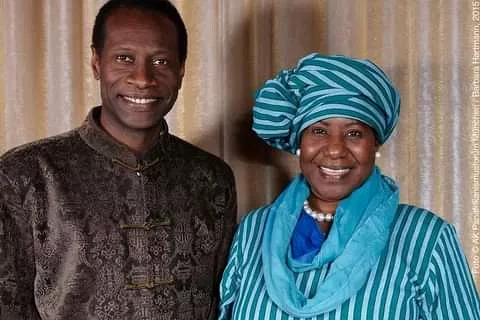
En octobre 2014, quand les plans de Compaoré deviennent clairs, et qu’il annonce sa volonté de modifier la Constitution, des centaines de milliers de Burkinabé descendent dans la rue. Le 31 octobre, Compaoré abdique (non sans avoir tenté de réprimer les manifestants2) et fuit le pays avec l’aide de l’armée française. Un nouveau champ des possibles s’ouvre alors aux militants du Grila et à la famille de Sankara.
Rien n’indiquait que le régime de transition, dirigé par un duo composé du président Michel Kafando, un ancien diplomate ayant servi le régime Compaoré (à l’ONU notamment), et du Premier ministre Yacouba Isaac Zida, un militaire issu du Régiment de sécurité présidentielle (RSP), considéré comme la garde prétorienne de Compaoré, rouvrirait les dossiers enterrés par le pouvoir déchu. Pourtant, le 24 mars 2015, près de 18 ans après avoir entamé ses démarches, la CIJS apprend que le dossier Sankara sera enfin instruit par la justice militaire. Très vite, celle-ci, sous l’impulsion du juge François Yaméogo – un magistrat « extrêmement courageux », estime Fall – lance une dizaine de mandats d’arrêts internationaux, dont un visant Blaise Compaoré, exilé en Côte d’Ivoire. Il ordonne en outre l’exhumation des tombes et entreprend de faire analyser l’ADN des corps qui s’y trouvent.
Malgré ces résultats décevants, les membres de la Campagne internationale Justice pour Sankara sont requinqués. Le 15 octobre 2015, Fall est reçu par le juge Yaméogo.
A l’issue de plusieurs mois d’investigations, François Yaméogo, qui n’arrive pas à obtenir suffisamment d’éléments probants pour prouver l’implication de puissances étrangères, mais qui a entendu des dizaines de témoins et inculpé vingt-deux suspects, décide de disjoindre le volet national et le volet international du complot, afin de pouvoir juger au plus tôt les responsables burkinabé. Le premier volet est clos – c’est celui-là qui est actuellement jugé -, tandis que le second volet est toujours en instruction, sous la direction d’un nouveau magistrat.
« LA VÉRITÉ, ÇA PREND DU TEMPS »
Les avocats de la CIJS, ayant accès au dossier, ont pu suivre les avancées du juge et ont notamment découvert le contenu des archives que la France a envoyées en trois lots, à la demande de la justice burkinabé. Ils se rendent alors compte que celle-ci savait tout ce qu’il se passait, à l’époque, à Ouagadougou – pour eux, elle ne pouvait pas ignorer le complot qui se préparait contre Thomas Sankara -, mais aussi que les archives transmises à la justice burkinabé semblent avoir été triées sur le volet à Paris de manière à ce que certains éléments ne soient pas divulgués.
Malgré ces obstacles et l’absence à la barre du principal accusé, Blaise Compaoré, et du chef du commando ayant mené l’opération le 15 octobre 1987, Hyacinthe Kafando, Aziz Salmone Fall a bon espoir que la vérité soit connue à l’issue du procès. Semaine après semaine, au rythme lent de la justice, les témoignages se succèdent à la barre du tribunal de Ouagadougou. Pour l’heure, ils n’ont pas permis de découvrir des éléments nouveaux, et ont même parfois donné l’impression d’un retour en arrière – plusieurs des accusés sont en effet revenus sur la version qu’ils avaient livrée durant l’instruction. Mais l’animateur du Grila ne veut y voir que du positif.

